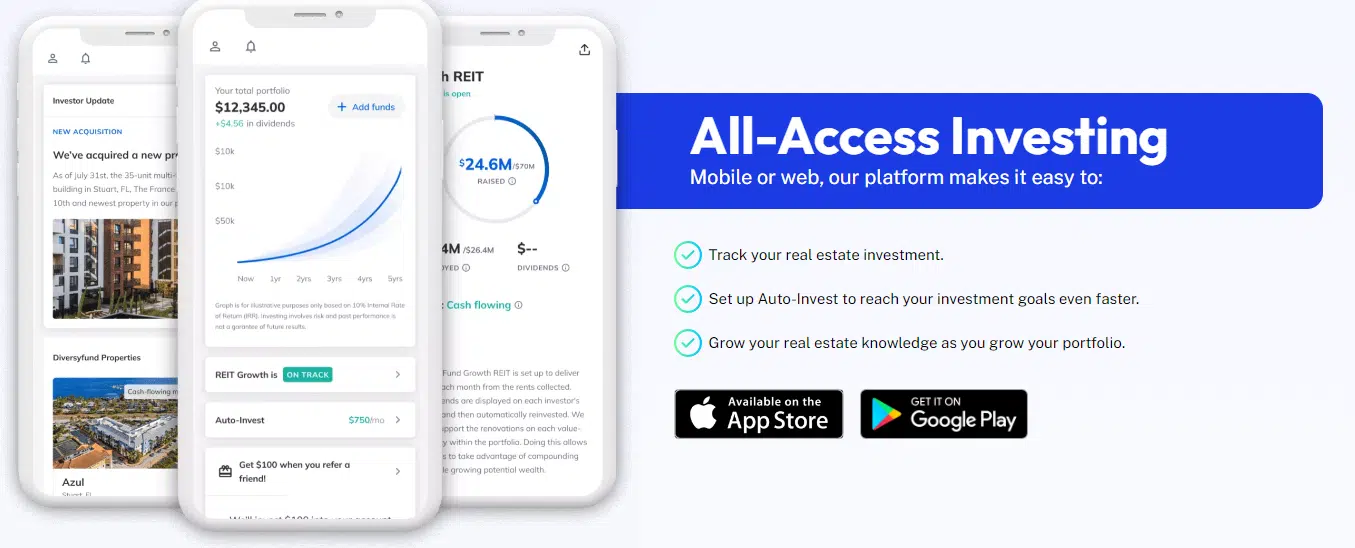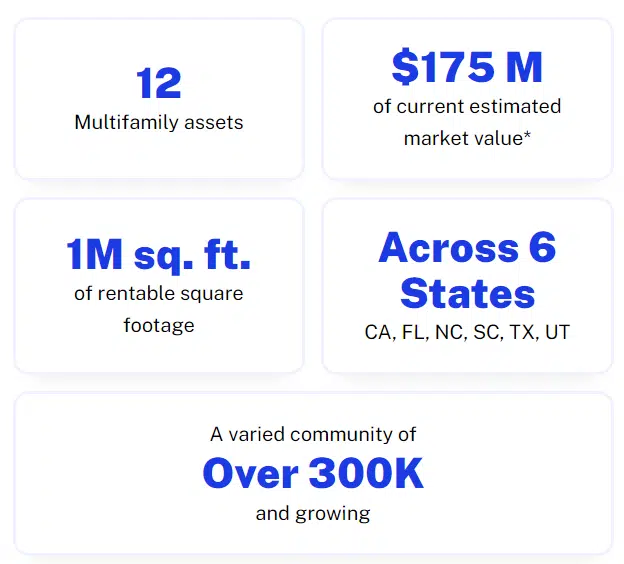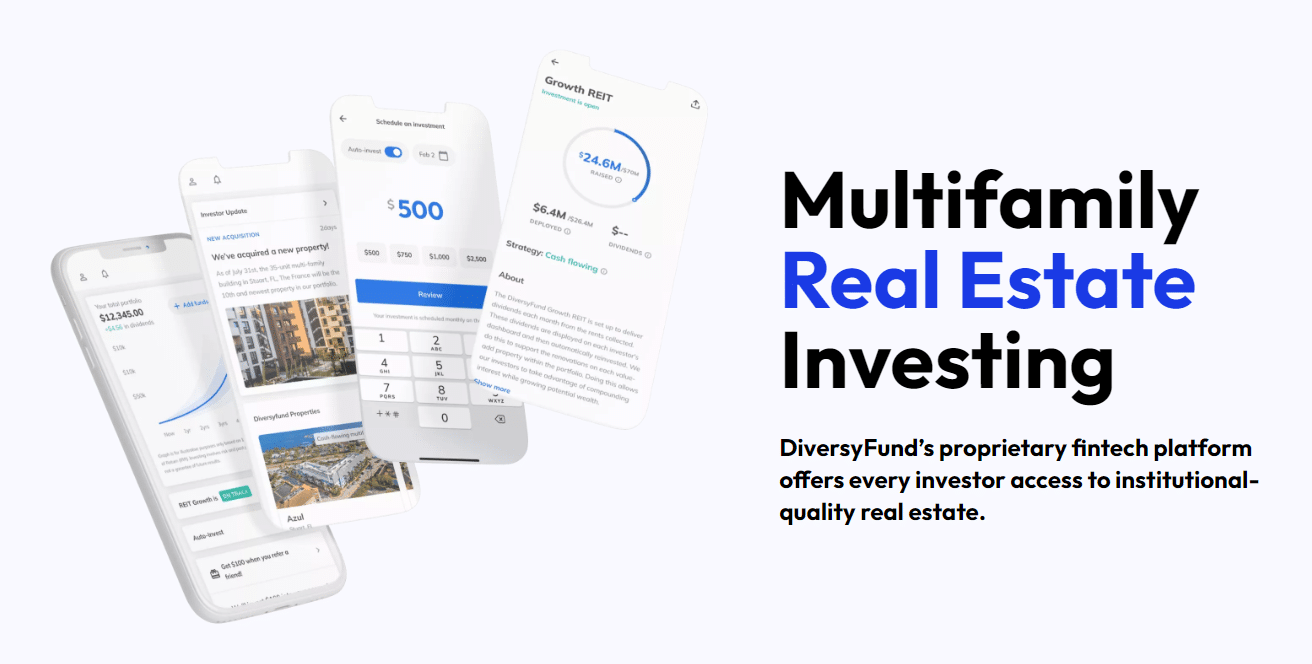DiversyFund allows users to invest in a portfolio of customized funds, but is it legit? This article takes an in-depth look at DiversyFund and how it works.
The digital age has greatly impacted the average person's ability to invest in various financial instruments. Nowadays, anybody with a smartphone or laptop and the drive to learn can invest in everything from long-term ETFs, real estate investments, options contracts, and much more.
However, having the ability to invest and understanding what you are actually investing in are two very different things. This is why ensuring that you understand the investment platform you are using, along with its offerings, is important.
To that end, DiversyFund burst onto the investment scene in recent years and quickly amassed a following of loyal investors. As a newer platform among existing investment sites, it's worth diving into the details of DiversyFund to see why it's become so popular.
This article will cover a comprehensive review of the DiversyFund platform, including how it works, the fees associated with use, and whether this platform is right for the everyday investor.
What is DiversyFund?
For those who have never heard of the platform before, DiversyFund is a digital real estate investing platform with both mobile and desktop functionality that gives both accredited and non-accredited investors access to private commercial real estate investments. For those confused about whether they count as "accredited," you do not qualify if you have under $1 million USD to invest.
DiversyFund was initially launched in 2016 with the same goal as many similar platforms: to make access to investments, specifically in real estate, further reaching. The company is unique because it is fully automated.
Going further, the collective experience of the company's executive leadership speaks to just how solid the foundation of DiversyFund is. For perspective, the co-founder and CEO at the company's helm is Craig Cecilio, who boasts 25 years of experience in capital raising, deal structuring, and the real estate industry. The other co-founder, Alan Lewis, also serves as the CIO of DiversyFund and has personally worked on transactions totalling $41 billion throughout his career.
DiversyFund 101: How does the platform work?
Understanding that DiversyFund has strong leadership and an established history is nice to know. However, it still doesn't inform a person how the platform works.
DiversyFund offers one option to investors and one option only: their Growth REIT. A REIT is simply a Real Estate Investment Trust which is a company that owns and, typically, operates income-producing real estate. In DiversyFund's case, the company is investing in multifamily properties across the following cities:
- San Francisco, CA
- San Diego, CA
- Dallas, TX
- San Antonio, TX
- Port St. Lucie, FL
- Charleston, SC
- Fayetteville, NC
- Greenville, NC
Should a person decide they want a piece of the pie, they need to invest $500 at a minimum into the Growth REIT that DiversyFund offers. A person can invest as an individual, jointly, as an entity, or even through a trust if they wish. Returns are entirely based on when properties are sold, which, when it occurs, results in an investor getting their principal back along with a preferred 7% return.
How a preferred return works depends entirely on when and how returns are paid out. Preferred returns simply mean that the party earning those returns is paid first. So, in the case of DiversyFund, profits earned are first paid out to investors (up to 7% ROI) before the company takes any profit. Then, investors can collect 65% of the remaining cash flows after the company has collected their contribution. This can result in an annual return of up to around 12%.
One essential item to note with DiversyFund in the name of transparency is that there is little liquidity. In financial terms, liquidity refers to how easily a financial instrument or security can be bought or sold in a secondary market. As an example, standard publicly-traded REITs on the stock market offer investors high liquidity as they can sell their positions at any time the market is open, in most cases.
With DiversyFund, however, investors must wait until the REIT manager closes the fund and liquidates the shares. While they will always announce target dates for this, there is no guarantee that they will do so at that specific time, making this one of many illiquid investments. This means investors partnering with DiversyFund should be prepared to leave the money they invested for years.
DiversyFund fees and taxes
As far as crowdsourced investment platforms go, DiversyFund is relatively cheap. There is a 2% annual asset management fee that must be paid along with a closing real estate transaction cost. Technically, this fee is not a true management fee, as an investor isn't charged directly. Rather, real estate crowdfunding platforms are faced with fees from the fund, sponsors, real estate developers, and more which get passed to the investors.
From a tax perspective, investors can treat this investment like any other in their portfolio simply sitting there. Until the fund is liquidated and the returns are realized (if there are indeed returns), a person doesn't need to worry about taxes on their DiversyFund investment. However, a person will still receive a Form 1099-DIV for any relevant cash payouts of dividends, which is a newer offering from DiversyFund in the last half a year.
The benefits and drawbacks to using DiversyFund
With the overview of what DiversyFund offers and what it costs investors outlined above, it's time to look at some of the primary pros and cons of using the platform.
Given that DiversyFund operates similarly to other digital investment platforms, generic economic volatility should be assumed as a constant drawback. Beyond this, however, the following are the most notable benefits and drawbacks to DiversyFund:
Benefits of DiversyFund
- The $500 minimum investment amount is arguably cheap for digital platforms that offer services to non-accredited investors, especially in real estate
- The 7% preferred return rate helps to ensure that investors earn a profit off applicable investments before the company does
- Traditionally, dividends would be automatically reinvested into the fund, but investors may now have the option to redeem their dividends in the form of a cash payout
- DiversyFund is constantly adding property in new states to their overall fund, which helps with investment exposure
Drawbacks of DiversyFund
- A 2% annual management fee (2 cents per dollar invested), while relatively cheap, is still high compared to other platforms that may be out there
- Investors who prefer to choose their own investments will not be able to do so on this platform
- Early withdrawals are not allowed, meaning a person has limited liquidity once their money is invested
- Success is tied to property values of multifamily properties located around the country
- The geography of the properties within the fund is relatively narrow, meaning a lack of appreciation in one region may not be offset by the other holdings
- It can be argued that to see the most success with such a REIT, a high net worth is required
How does DiversyFund compare to competitors?
Naturally, DiversyFund is not the only digital real estate investment platform today. There are three primary competitors to DiversyFund: Yieldstree, RealtyMogul, and Fundrise. Breaking down the differences between DiversyFund and its competitors, along with what makes DiversyFund stand out, can help potential investors determine who they want to invest their money with.
DiversyFund vs. Yieldstreet
The primary difference between DiversyFund and Yieldstreet is that the latter offers more options to a potential investor. Beyond multi-asset class funds, Yieldstreet also provides investors access to alternative investments and short-term notes. However, minimum investments on Yieldstreet are typically $10,000, as indicated by the company, making this a more exclusive platform.
While non-accredited investors can technically use Yieldstreet, it wouldn't be considered as "beginner-friendly" as DiversyFund.
DiversyFund vs. RealtyMogul
When considering DiversyFund vs. RealtyMogul, the difference again lies in how many offers each platform provides. Unlike DiversyFund, RealtyMogul offers two different REITs that investors can choose from. Their "Income REIT" tends to be more risk-averse and emphasizes debt offerings to earn monthly dividends.
On the other hand, their "Apartment Growth REIT" is fairly similar to the DiversyFund REIT, only with a wider coverage from a geographical standpoint for multifamily properties, including apartment complexes. It has a lower annualized rate of return at 4.5%, though this can increase when properties are sold. Investing in either of these REITs requires a minimum of $5,000. Platform fees are lower at up to 1.25% of the equity value.
For accredited investors who may be interested, RealtyMogul also offers a "Private Placement" option which allows access to 1,031 exchanges. These give investors access to custom offerings and additional control throughout the investment process.
DiversyFund vs. Fundrise
Finally, the other primary competitor that DiversyFund is forced to contend with is Fundrise. Fundrise is also arguably the biggest competitor to DiversyFund as they offer similar value-add instruments on their platforms. Fundrise has five main account levels, though the first three target non-accredited investors.
Those five plans are Starter ($10 minimum), Basic ($1,000 minimum), Core ($5,000 minimum), Advanced ($10,000 minimum), and Premium ($100,000 minimum). The Starter plan gives an investor access to an eREIT owned and managed by Fundrise and access to purchasing into self-directed IRAs and Fundrise IPOs.
An investor looking for additional features such as automatic reinvestment must meet the $1,000 minimum threshold for the Basic plan. Fundrise does have low minimums and cheaper management fees. Still, the site's average income return is only 5.29%, making it slightly worse performing.
Who is DiversyFund right for?
Considering everything, you still may not be sure who DiversyFund is a good option for. In short, investors interested in DiversyFund's growth REIT with an investment time horizon of at least a couple of years can benefit from this platform. Given that it is meant for long-term investments and only offers one fund to invest in, it's also best for investors hoping to get started with real estate without knowing much about this type of investing.
Always remember that the average annualized returns estimated by DiversyFund are not guaranteed and that your investments will be tied to the success of multifamily properties around the country.
DiversyFund FAQs
Even after covering the above information on the DiversyFund platform, it's only natural to have some remaining questions. Below are four of the most commonly asked questions regarding DiversFund, which can help you gain a better sense of the company:
What is the return rate for DiversyFund?
As with any investment platform, there is never a guaranteed rate of return when investing money. However, DiversyFund offers a preferred return of 7% of the invested capital from the operating cash flow from the fund, meaning money is paid first to investors until they get a 7% return. Once this is reached, investors can collect 65% of any remaining cashflows after the REIT sponsors take advantage of the catch-up contribution, meaning investors can earn a total annual return of up to 12%.
Is there a minimum investment amount with DiversyFund?
Yes, DiversyFund requires a minimum of $500 to invest on their platform, which was recently just lowered from a higher $2,500 initial minimum investment amount.
Is DiversyFund safe?
DiversyFund is a legal and accredited real estate investment company registered with the securities exchange commission. With that said, any investment platform that allows non-accredited investors to trade in financial instruments carries more risk as there is a general lack of knowledge amongst the investors.
Does DiversyFund pay dividends?
Traditionally, DiversyFund did not offer standard dividends that were given to investors in the form of a cash payout. Rather, dividends were earned and automatically reinvested into the existing holders in an investors' portfolio. However, in late 2022, DiversyFund announced its first cash payout for a dividend on its REIT 1 fund.
The bottom line
The choice of which investment platform to use is entirely a personal decision. Just be sure to evaluate each platform's pros and cons, specifically focusing on the cost and what financial instruments they allow an investor to trade. This can help guide you to a platform that offers what you want.
Additionally, the nuances real estate investors face in their investment decisions are unique compared to those faced by investors who strictly deal with traditional stocks, bonds, or other financial instruments. All new investors, especially those considering real estate, should take the time to study the assets they are considering investing in so that they truly understand where their money is going.
The process of making smart investments starts with developing an educational foundation regarding the investment you are considering. Therefore, whether it's DiversyFund or another similar real estate investing platform, take the time to study your options before diving in.



